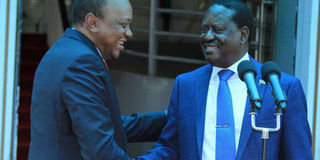Kenyans’ political ways are so strange, maybe it’s in the DNA

President Uhuru Kenyatta (left) and Nasa leader Raila Odinga conclude a joint press conference at Harambee House in Nairobi on March 9, 2018. They called for unity. PHOTO | JEFF ANGOTE | NATION MEDIA GROUP
What you need to know:
- It appears that our democratic credentials are like a thin layer of margarine on otherwise solid tribesmen whose faith and trust is in the tribal shaman.
- It embarrasses us to see how deeply buried we are in our tribes and how uncritically obedient we are to our tribal leaders.
Kenyans are, surely, a strange breed. I used to think that my tribe was strange; now I know that in Kenyan terms it is just normal.
The speed and finality with which the meeting last week between President Uhuru Kenyatta and Nasa leader Raila Odinga has altered the national mood, pumped up the shilling, driven up share prices and almost totally devastated the political careers of Mr Musalia Mudavadi, Mr Kalonzo Musyoka and Mr Moses Wetang’ula — and battalions of open-mouthed political chicks below them — is the stuff of things going bump in the dark of an African night.
It is dizzying to see people who were so fed up with Kenya and were demanding secession now wearing the flag on their lapel just because two men had a quiet word behind closed doors, came out and issued a statement.
TRADE
My tribe came from Manda Island in Lamu, which they called Mbwa. This is science, not ethnic fiction.
They had journeyed there from Shungwaya, some ancient joint near the Tana, most probably after being scattered by some Orma-speaking tough guys from up north.
In Mbwa, my people appear to have invented the beach boy economy; they just hang around and scooped iron ore from the ground and made weapons and tools, which they traded for fun stuff from their Swahili-type neighbours.
Their island home was not a true island; during low tide, dry land was exposed and they could walk across.
Often, when the sea flooded back, elephants would often be caught in the tide and drowned.
My ancestors would harvest their ivory, which they, again, sold to their Swahili neighbours.
SLAVERY
They grew food, too, and kept animals and a good trade was established.
Until the Swahili, who were growing in power and whose population was swelling and needed bigger supplies of food, sat back, thought for a long time and said: Wait a minute. Why do we need to keep paying these fools.
Why not put them in chains, whip them and force them to produce even more food and tools without paying a copper penny?
So they put my folks in chains and forced them to work for free.
When things got to this point — and I am coming to the point — the folks turned to their ultimate leader, the master strategist, the seer of the future, the solver of all problems, the prophet of all things good — the Mugwe.
MUGWE
And so he outwitted the colonisers and led the people upcountry in search of good land and people with cattle to steal.
It took them 40 years to trek 600 kilometres or so and, therefore, the Mugwe’s geography was a bit weak.
But, in his defence, I will also point out that this was a strange land; my folks were coastal people and knew not bara (upcountry).
The tribe trusted the Mugwe absolutely. They left decisions of life and death to him (or her) and obeyed his decisions without question or debate.
Many years later, when the white people arrived in our lands, the Mugwe forbid tribal warriors from laying a finger on them and ordered the tribe’s armies — and they had trained many to steal cattle, push some folks off their land and generally harass each other — to surrender without a fight.
MUTINY
I think it is one of the best-kept scandals of my tribe that they knelt to the white man without a fight on the orders of their prophet.
And for the first time in history, those orders pushed armies into sporadic acts of mutiny, which took a lot of witchcraft and many horrible curses to stamp out and give the British dominion over a fiercely independent nation.
I recently read that, for half a century, the British sought to unmask the identity of the reigning Mugwe without success.
He or she may still be there, pulling strings behind the scenes and hiding in plain sight and we’d have no clue.
It appears that our democratic credentials are like a thin layer of margarine on otherwise solid tribesmen whose faith and trust is in the tribal shaman, medicine man, seer, prophet, wise man, great leader, king, chief, guide or whatever name you choose.
MEDICINE MEN
The only difference is that the modern medicine men are poorly dressed in Western suits rather than body art, war paint and gorgeous colobus monkey head dress or plumes of ostrich feathers.
When I was a linguistics student alongside other great Kenyan revolutionaries like Billy Graham Kasire, Steve Analo Makonjio, Eric Munene, Nyabuto Choti, Mukala, to name but a few, we learnt that even though you may acquire a second language, the psychology of your mother tongue lies buried in your brain in intrusive fossils, which intervene phonetically, syntactically and in other ways in your use of your precious second language.
Similarly, in our political DNA, there is something buried there which makes us strange political beings.
It embarrasses us to see how deeply buried we are in our tribes and how uncritically obedient we are to our tribal leaders.
I don’t know whether to slit my wrists or don my colobus monkey head dress, attach cow bells to my ankles and break out in song and dance.
Don’t worry, it’s our fossils acting up.





